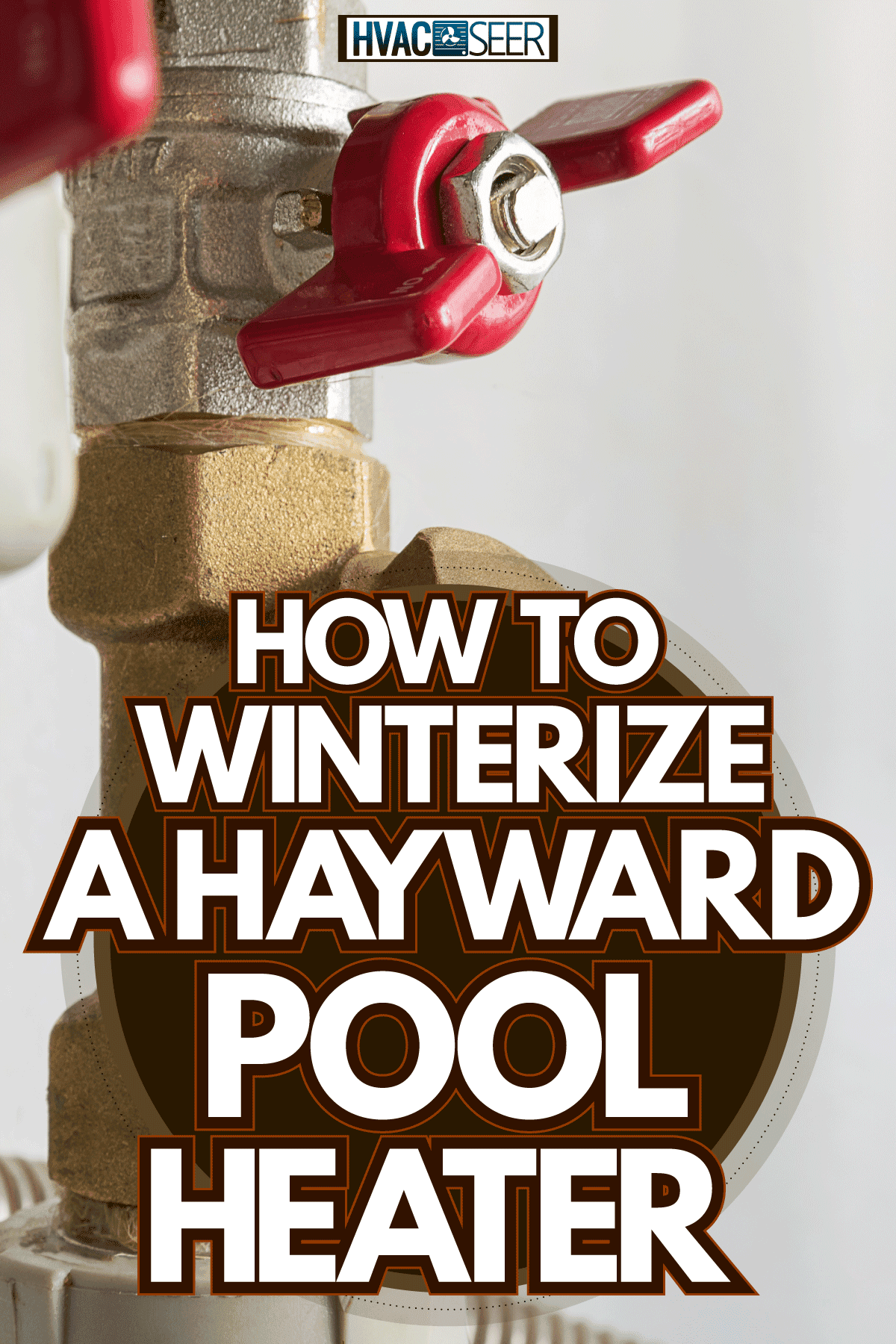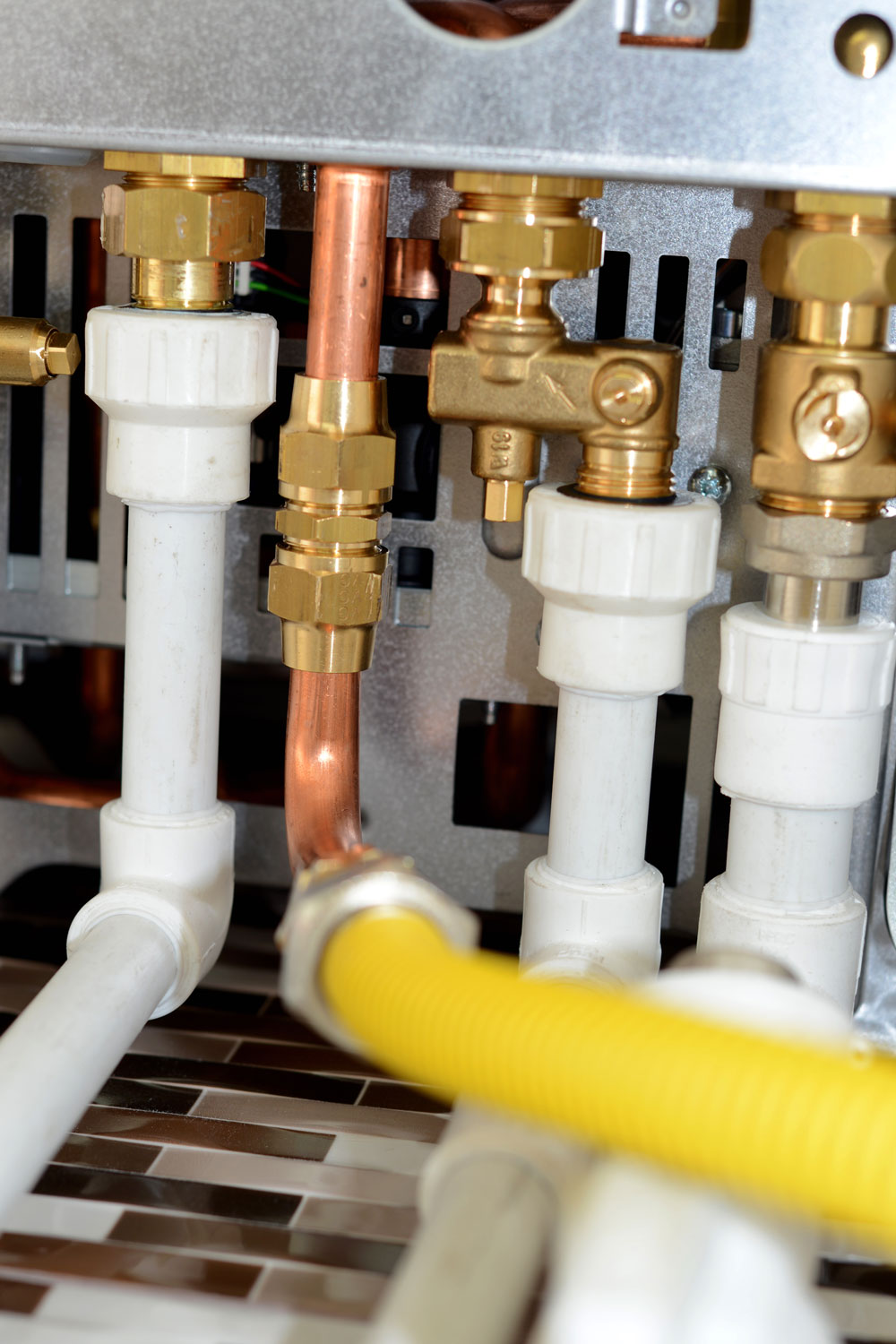A pool heater enables you to optimize your investment in a pool by helping you achieve comfortable swimming water temperatures and extending the time when you can use the pool in a year. However, it faces the risk of potential freeze damage when temperatures plummet. How can you winterize a Hayward pool heater in the wake of the harsh winter climate? We talked to the technical experts, and here are their thoughts.
To winterize a Hayward pool heater:
- Turn off the power supply.
- Disconnect the pipes.
- Drain the water from the pool heater.
- Cover the Hayward pool heater.
You now have a general guide on how to winterize your Hayward pool heater. Keep reading as we discuss these steps further. In addition, we will address how you can keep your pool heated through the year and some considerations when choosing a pool heater.

How to winterize a Hayward pool heater
Water expands by approximately 9% when it freezes. Thus, when you experience extremely low temperatures or prolonged periods with temperatures at or below freezing, the harsh climatic conditions can result in freeze damage to your pool heater.
If water remains in the heat exchanger during the cold season, it will expand and cause cracks on the appliance, damaging the unit. Winterizing your Hayward pool heater protects it from freeze damage and increases its longevity.
Winterizing is especially important if you live in regions that experience harsh winters with frequent snow. Moreover, most pool heater warranties and homeowner insurances do not cover damage resulting from freeze-ups.
It is, therefore, rational to take the appropriate steps to mitigate freeze damage. Follow these simple steps to winterize your Hayward heat pump pool heater.
1. Turn off the power supply
The pool heater requires a power connection to take water from the pool, run it through a heat exchanger where the water temperature is raised to a desirable level, then send the warmer water back into the pool.
When you disconnect the power supply, the circulation pump responsible for drawing water from the pool and back into it again goes off. With water not being drawn into the heat pump, it becomes easier to carry out the next steps.
2. Disconnect the pipes
Detaching the inlet and outlet pipes at the unions enables you to drain the water from the pool heater. Slightly tilt the heater to aid in draining most of the water.
3. Drain the Residual water
It is recommended to blow through the pool heater to eliminate residual water. As mentioned before, any water left in the pool heater during winter increases the risk for potential freeze damage to the pool heater, which is expensive to repair.
4. Cover the heater
It is unnecessary to move the pool heater indoors in preparation for winter. However, you can use a breathable cover to protect it from elements such as snow and ice. Ensure that the cover does not promote moisture build-up to mitigate damages on your appliance from rust and corrosion.
This cover is large enough for a Hayward heater -cinch it to fit snugly. See it on Amazon.
Rodent proof the heater by loosely connecting the inlet and outlet pipes. The loose connection allows water to drain while keeping rodents that may chew on the wires or cause other internal damages on the heater out.
It is a good idea to schedule your pool heater's annual maintenance during this season when you are not using it. Maintenance ensures that the heater is ready when the next swimming season begins.
How can you keep your pool heated?
Heating the pool keeps the water at a comfortable temperature for you to enjoy swimming. Also, it lengthens your swimming season as you can still get favorable water temperatures even when the weather is chilly.
There are various options available on the market to keep the pool heated. Heating also comes in handy if you intend to keep the pool open during winter. It is recommended that you retain the water temperatures above freezing level to minimize the risk of ruptured pipes and other expensive damage to your pool.
Gas pool heaters
Gas pool heaters heat your water quickly. Therefore, you do not need to wait for long for the water to reach comfortable levels. Additionally, because they rely on natural gas or propane as an energy source, they are a reliable way of heating the pool, especially when the outdoor temperatures are quite low.
Although these heaters are relatively inexpensive to buy, they have higher operating costs. They are not very energy efficient as they use more energy to get the same job done than the alternative heating options.
Further, the unit has a short lifespan of about 5 years on average and will need you to replace it sooner than alternative heating options.
Check out this Hayward natural gas heater on Amazon.
Electric resistance pool heaters
Although electric resistance pool heaters have a higher upfront cost when compared to gas heaters, they are more energy-efficient. These heaters don't need to work as hard as gas heaters to maintain the desired temperature once that is achieved. The improved efficiency reduces the operating costs of running the heater periodically.
These heaters are also quite reliable since they depend on electricity as a source of energy rather than outdoor temperatures. Therefore, they can be used throughout the year, provided the winter temperatures are not harsh, thus not posing the risk of freeze damage on your pool equipment.
Read this article to discover "5 Electric Pool Heaters For Inground Pools."
Heat pump pool heaters
These are by far the most energy-efficient heaters. They rely on the outdoor air temperature to heat your pool water and only require a small amount of energy to transfer heat from the air to your pool water. For this reason, they have the least operation costs when compared to gas and electric resistance pool heaters.
However, they are not as dependable as the alternative heaters since their use largely depends on outdoor temperatures. When the temperatures plummet, you will not achieve the desired temperature for the swimming water. So, you will not derive the benefits of owning a pool.
Check out this Hayward electric heater, especially for in-ground pools. See it on Amazon.
Solar covers
In addition to installing a pool heater, it is also advisable to invest in solar covers to mitigate heat loss through evaporation. The solar blanket absorbs solar energy and minimizes evaporation, retaining most of the heat in your pool water.
Considerations when choosing a pool heater

Investing in a pool heater is a significant investment. Hence, it is important to ensure that you settle for the best available option on the market, suitable for your swimming pool. Choosing the right heater will give you value for your money.
Size
A larger pool requires a larger heater with a higher heating capacity to operate smoothly. A larger pool heater will also heat the water a lot faster. Also, it is recommended to opt for a heater with a higher heating capacity if you intend to run the heater most of the time rather than intermittently.
Efficiency
The efficiency of heat pumps is measured by the coefficient of performance (COP). The higher the COP, the more efficient a unit is. This efficiency translates to the operating costs of running the heater. When the unit is energy-efficient, the operational costs will be minimal.
Ensure that the heater is installed properly and maintained annually to optimize its efficiency.
Power source
The type of heater you opt for will depend on the available power sources and relative temperatures where you live. If your area has mild winters, investing in a heat pump is suggested as the savings will be more in the long run.
However, when the cold season is long and harsher, either opt for a gas or an electric resistance pool heater.
It is best if you first check whether the gas line in your area will support the heater before buying it. If the gas lines are further away, the installation costs will rise, increasing the required initial output to get your heater running.
For electric resistance heaters, ensure that you have power at the location where you intend to install the unit.
Cost
Gas heaters are the most affordable of the three available heater options, followed by electric resistance heaters. Heat pumps are more expensive than both alternatives. However, the initial cost is inversely related to operating expenses. It is therefore important to consider the option that works best for you.
These heaters also have different expected lifespans. The longer the expected lifespan, the more benefits you will derive from the unit in the long run. Read this article to determine "How Long Do Pool Heaters Last?"
Type of pool
Above-ground pools will require much more powerful pool heaters as they lose heat faster than in-ground pools.
In Closing
Pool heaters are a significant but worthwhile investment. They enable you to keep the pool open for longer and achieve comfortable pool water temperatures. Winterizing your Hayward pool heater is advisable to protect it from frozen damage whenever the winter climate is harsh or prolonged. We hope that this article will guide you on doing it properly.
Considering all the pool heater options available on the market, opt for one that meets your needs and is within your budget. You do not need to break the bank to keep your pool heated. Additionally, ensure that your unit is serviced annually by trained professionals to keep it in good working condition, longer.



